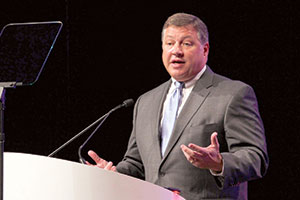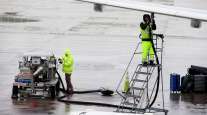Senior Reporter
Meal, Rest Break Measure Not Included in Senate Panel's Aviation Reform Bill

This story appears in the March 14 print edition of Transport Topics.
WASHINGTON — A trucking-related provision hotly debated in the House has not been included in an aviation reform bill a Senate panel will take up March 16.
The leaders of the Senate Commerce Committee did not add to the aviation bill a provision that would prevent states from enacting laws requiring companies to schedule meal and rest breaks for drivers or to pay them by the hour.
But that’s not to say trucking and non-aviation issues will not come up at the legislative hearing. Senators are expected to propose changes to the bill in the form of amendments. Senate aides told Transport Topics several amendments are likely not to be about aviation programs. Specifics on amendments were not available by press time.
Overall, the panel’s bill would reauthorize Federal Aviation Administration programs through the end of fiscal 2017.
“This bill benefits Americans who fly and even those who don’t. The U.S. Senate has an opportunity to make our skies safer, promote responsible drone usage, make economically significant aerospace manufacturing reforms and adopt beneficial new protections for the flying public,” Commerce Committee Chairman John Thune (R-S.D.) said.
“Over the past few years, our committees have successfully worked together on a highway bill, Amtrak legislation and a Surface Transportation Board reauthorization. I look forward to continuing our work and building upon our previous successes by completing an FAA bill,” added Rep. Bill Shuster (R-Pa.), Thune’s counterpart in the House.
Shuster’s FAA bill, which his committee advanced to the chamber’s floor last month by a vote of 32-26, included a provision related to meal and rest breaks for truckers. That trucking language, as well as a proposal that would privatize the federal air traffic control system, contributed to Republican leaders’ decision to halt the bill’s consideration on the floor of the House.
Trucking industry leaders pushed for the meal- and rest-break provision in the House bill.
“The singular purpose of our legislative effort is to reassert the uniform and consistent set of work rules that Congress had previously determined make sense for the interstate movement of freight,” American Trucking Associations President Bill Graves told TT.
The meal-break provision in the House bill is aimed primarily at blocking a California meal break law, signed in 2011, that requires employers to provide a “duty-free” 30-minute meal break for employees who work more than five hours a day and a second “duty-free” 30-minute meal break for those who work more than 10 hours a day.
Ahead of FAA’s authorization expiring at the end of this month, Shuster and Ways and Means Committee Chairman Kevin Brady (R-Texas) on March 10 introduced a measure that would authorize FAA programs through July 15. The House and Senate are expected to consider the short-term measure this week.
“Yesterday, the Senate introduced its own FAA legislation, and I look forward to working with them to produce a final bill. In the meantime, while both House and Senate continue efforts to move each bill forward, we need to pass an extension to ensure that the FAA and the federal aviation programs remain fully funded,” Shuster said.




